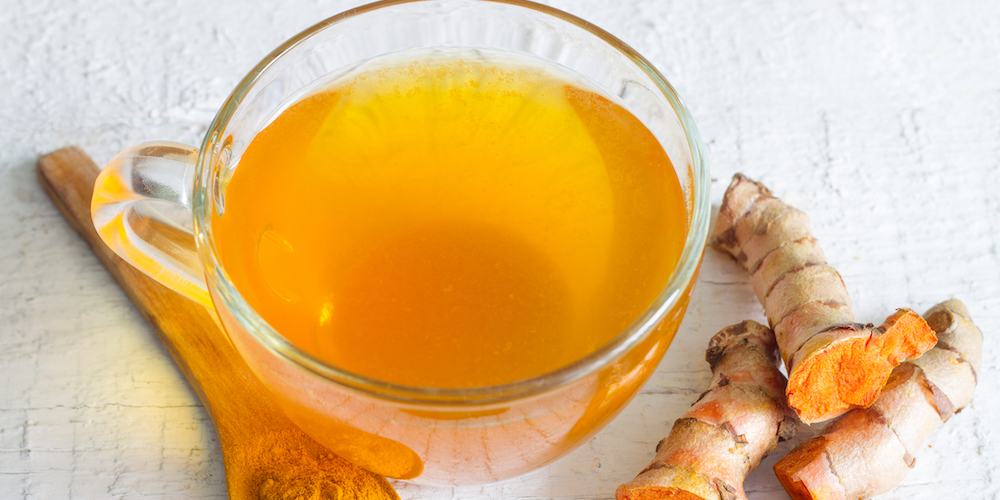Turmeric Tea Benefits & Side Effects

Turmeric tea has been used for centuries in traditional medicine and is now gaining popularity as a natural health remedy. Turmeric contains many compounds that have beneficial effects on your body, including powerful antioxidants.
It has anti-inflammatory properties, antibacterial activity, and more. One of the well-known Turmeric tea benefits is to reduce inflammation, boost immunity, improve gut health, reduce pain and stiffness from arthritis and help fight cancer.
This tea can also help protect the heart by reducing cholesterol levels and lowering blood pressure. It can also aid in digestion due to its high content of dietary fibre. Also been proven to help aid weight loss by promoting feelings of fullness while boosting metabolism.
Table of Contents
- Benefits of Turmeric Tea
- 1. Turmeric Tea Weight Loss
- 2. Turmeric Tea for Inflammation
- 3. Does Turmeric Tea Help you Sleep
- 4. Turmeric can Help Manage IBS
- 5. Can Help Prevent or Manage Diabetes
- 6. Benefits of Turmeric Tea for Skin
- 7. Turmeric is Good for Heart Health
- 8. Aid those who Suffer from Arthritis
- 9. Turmeric May Have Cancer Benefits
- 10. May Help with Alzheimer’s Disease
- 11. Can Benefit Asthma and Lungs Health
- Turmeric Tea Side Effects
- Conclusion

Benefits of Turmeric Tea
Turmeric contains several vitamins and minerals, including calcium, iron, magnesium, phosphorus, potassium, zinc and copper. It also contains polyphenols which are powerful antioxidants that can help protect the body from free radical damage and keep cells healthy.
The health benefits of turmeric tea go beyond just physical health, it can also positively affect mental well-being by reducing stress and anxiety levels. Turmeric tea can also help improve mood and cognitive function due to its combination of beneficial compounds such as curcumin and polyphenols.
Ultimately, it has a wealth of potential health benefits that make it an ideal beverage choice for anyone looking to improve their overall health.
1. Turmeric Tea Weight Loss
Drinking Turmeric Tea can also help support weight loss efforts. It contains dietary fibre which helps to keep you feeling full for longer, thus reducing the amount of food you eat and allowing you to lose weight. It can also boost metabolism which helps to burn more calories, resulting in greater fat loss.
In addition, Turmeric Tea Benefits include its anti-inflammatory properties which can reduce inflammation in the body and help with bloating or water retention. Also thought to help balance hormones that regulate appetite and cravings, so it can be beneficial for those looking to cut back on unhealthy snacks or overindulging in food.
Research has indicated that Turmeric may be a powerful dietary supplement for managing metabolic disorders. A recent meta-analysis found evidence to suggest it could help reduce body mass index and leptin levels, which regulate diet control and fat storage in the human body. In other words, Turmeric may be an effective aid in achieving long-term weight management goals with greater success!

2. Turmeric Tea for Inflammation
Often touted for its anti-inflammatory properties. Inflammation is a natural process used by the body to fight off infection and repair damage. Chronic inflammation, however, can be detrimental to your health and may increase your risk of developing conditions such as heart disease, diabetes, and certain types of cancer.
The active compound in Turmeric Tea, Curcumin, has been shown to reduce inflammation in the body. This can be beneficial for those suffering from chronic inflammatory diseases such as arthritis or Crohn’s disease.
But also for those looking to improve their overall health with a natural remedy. By reducing inflammation in the body you may experience reduced pain and stiffness, improved immunity and better regulation of hormones that affect appetite and weight loss.
Preliminary studies have suggested that the natural, anti-inflammatory properties of curcumin – an active component in Turmeric – may be beneficial to human health. According to research from 2017, evidence suggests this might also extend into managing and curing oxidative or inflammatory conditions.
3. Does Turmeric Tea Help you Sleep
These benefits also extend to improving a person’s quality of sleep. Turmeric is known for its anti-inflammatory and antioxidant properties, which can help reduce stress levels and improve mood. It can also help regulate your body’s natural circadian rhythm, allowing you to wake up feeling more refreshed and energized in the morning.
In addition, Turmeric tea’s health benefits include providing relaxation before bedtime; it contains L-theanine, an amino acid that helps promote feelings of calmness. It may even reduce symptoms associated with insomnia, such as difficulty falling asleep or staying asleep.
Finally, Turmeric Tea can also help in reducing the physical effects of stress on the body which can lead to improved sleep quality.

4. Turmeric can Help Manage IBS
Irritable Bowel Syndrome (IBS) is a common gastrointestinal disorder that affects 10-15% of the population. It can cause symptoms including abdominal pain, bloating, and changes in bowel movements.
It can benefits those with IBS by helping to reduce inflammation in the gut which can help relieve some of these uncomfortable symptoms.
Turmeric also helps to increase bile production and reduce the amount of time it takes for food to travel through your digestive system, both of which can help ease IBS symptoms. This makes Turmeric tea an excellent addition to any diet for people suffering from IBS or other digestive issues.
Despite the promise of curcumin in managing IBS, further research is essential to better understand how it may affect other intestinal-related conditions like Crohn’s disease and ulcerative colitis. Increasingly, its potential as a natural remedy for these inflammatory ailments looks increasingly promising.
5. Can Help Prevent or Manage Diabetes
Diabetes is a chronic condition that occurs when the body can’t produce enough insulin or can’t use the insulin it produces. Turmeric tea benefits those with diabetes by helping to regulate blood sugar levels.
Studies have shown that it helps reduce markers of inflammation in people with type 1 and type 2 diabetes, which can help improve their overall health and well-being. Turmeric has also been found to increase insulin sensitivity, which may help lower glucose levels and improve metabolic control in those with diabetes.
Curcumin, a component of this spice is proving to be an effective natural treatment for diabetes. Studies involving humans and animals have demonstrated its antidiabetic properties, making it an exciting remedy with potential therapeutic applications.
Finally, Turmeric tea benefits diabetics by helping them maintain weight as it is low in calories and carbohydrates but high in fibre. This makes it an excellent addition to any meal plan for those looking to manage

6. Benefits of Turmeric Tea for Skin
Acne is a common skin condition that causes pimples, blackheads and whiteheads to form on the face, neck, chest, back and shoulders. It affects people of all ages and can cause physical discomfort and emotional distress.
The tea benefits can include helping to reduce inflammation associated with acne by inhibiting the production of inflammatory molecules in the body.
Turmeric has also been shown to have powerful anti-bacterial effects which can help clear up existing breakouts while preventing new ones from forming. Curcumin, a component of this spice is proving to be an effective natural treatment for acne as well.
It has long been sought out for its anti-inflammatory and antioxidant benefits, making it popular in the skincare industry. Additionally, Turmeric helps to reduce oil production on the skin which can lead to a clearer complexion.
It can also help to reduce the appearance of dark spots and hyperpigmentation on the skin, making it a great addition to any skincare routine.
7. Turmeric is Good for Heart Health
Heart disease is a common problem, especially in countries with high rates of obesity and diabetes. It can help those at risk of heart disease by helping to reduce inflammation in the body which can help protect against cardiovascular problems. Turmeric also helps to reduce levels of triglycerides, bad cholesterol and LDL cholesterol while increasing levels of good HDL cholesterol.
Additionally, Turmeric Tea has been found to be beneficial for those with high blood pressure as it helps to relax and dilate blood vessels, making it easier for your heart to pump blood throughout the body. Also it helps improve circulation which can lead to better health overall.
In a recent study, long-term use was found to lower systolic blood pressure – the measurement of how much force is exerted on arteries with each heartbeat. This suggests that using this popular spice may have potential cardiovascular benefits.

8. Aid those who Suffer from Arthritis
Arthritis is a chronic condition that causes joints to become swollen, tender and inflamed. Turmeric tea benefits those with arthritis by reducing inflammation and helping to alleviate pain and stiffness in the affected joints. Turmeric has been used for centuries as a natural remedy for joint pain due to its anti-inflammatory properties.
Research suggests that curcumin, one of the active components may help reduce inflammation associated with arthritis. It can also be beneficial for those suffering from rheumatoid arthritis (RA) as it helps to reduce levels of inflammatory markers in the body. Finally, it can help improve mobility in those who suffer from this painful condition.
Recent research revealed that a remarkable proportion of US adults with self-reported rheumatoid arthritis opt to use non-vitamin supplements, such as Turmeric, to sustain their well-being. The study found this number was an impressive 63%.
Turmeric tea is becoming an increasingly popular natural remedy for those suffering from arthritis. If you are considering using this herbal tea to help manage your symptoms, be sure to speak with your doctor or medical professional if you are unsure if turmeric is appropriate for you.
9. Turmeric May Have Cancer Benefits
Cancer is a disease caused by the uncontrolled growth of cells in the body which can lead to severe health complications and even death. Turmeric has been used as an aid for cancer due to its anti-cancer properties. It may help those with cancer by helping to reduce inflammation, aiding in cell growth regulation, and protecting against oxidative damage.
Curcumin, one of the active components of turmeric, has been found to be effective at inhibiting tumour growth in various studies. Turmeric also helps modulate levels of key enzymes within the body responsible for regulating cell growth.
Proliferation can help protect against cancerous cells forming or spreading throughout the body. In addition it contains powerful antioxidants which help to protect cells from oxidative damage which can contribute to the development of cancer.
A recent test-tube study has found that it might be possible to reduce cancer growth and spread, ultimately leading to cell death. This promising development at the molecular level could revolutionize treatments for this life-threatening condition.
It is important to note that while turmeric may benefit those with cancer, it should not be considered a replacement for traditional treatments such as chemotherapy or radiation therapy.
Turmeric tea may play a role in helping manage symptoms and side effects associated with cancer but further research is needed before any definitive conclusions can be made about its effectiveness against this disease.

10. May Help with Alzheimer’s Disease
Alzheimer’s disease is a severe neurological disorder which causes problems with memory, thinking and behaviour. Turmeric tea benefits those with Alzheimer’s by helping to delay the progression of the disease and reducing cognitive decline associated with it.
Turmeric contains powerful antioxidants which help to protect cells from oxidative damage, as well as anti-inflammatory properties which can help reduce inflammation in the brain.
In addition, it is effective at inhibiting enzymes linked to decreasing communication between neurons in the brain, ultimately leading to improved memory and overall cognitive performance. It also helps modulate levels of key enzymes within the body responsible for regulating cell growth and proliferation which can help protect against neuronal death caused by Alzheimer’s.
Finally, it’s demonstrated promising potential in reducing the amyloid plaques associated with age-related conditions, while also potentially slowing down or preventing some of the degenerative protein changes that arise as a result of ageing.

11. Can Benefit Asthma and Lungs Health
Asthma is a respiratory disorder caused by inflammation and narrowing of the airways which can make it difficult to breathe. Turmeric tea benefits those with asthma by helping to reduce inflammation in the lungs, aiding bronchodilator activity, and protecting against oxidative damage.
Curcumin is effective at inhibiting enzymes linked to decreasing airway obstruction while also having an anti-inflammatory effect on the lungs. Turmeric may also help improve lung function and reduce symptoms associated with asthma such as difficulty breathing, coughing, and wheezing.
A recent medical review offers a promising outlook: Curcumin, the primary component of turmeric – long used traditionally for its healing benefits – could potentially provide relief from several pulmonary conditions such as asthma, cystic fibrosis and chronic obstructive pulmonary disease. Its potential even extends to lung cancer or injury treatment!
Turmeric Tea Side Effects
Generally it is considered safe, however, there are a few potential side effects and precautions to be aware of. Turmeric can reduce blood sugar levels so people with diabetes should be careful when drinking this tea and monitor their blood sugar closely.
It may also interact with certain medications so it’s important to consult your doctor before adding turmeric tea to your diet.
In addition, if you experience any adverse side effects after drinking turmeric tea such as an upset stomach or rash, stop drinking the tea immediately and seek medical advice.
Finally, while it has many benefits, it should not be used as a replacement for traditional treatments such as chemotherapy or radiation therapy for cancer.
Conclusion
Overall, this tea offers numerous health benefits with strong implications for those suffering from cancer, Alzheimer’s disease, and asthma. Turmeric is an incredibly powerful antioxidant which helps protect cells from oxidative damage while reducing inflammation in the body.
Ultimately it’s important to remember that while consuming Turmeric Tea may provide some benefits, it should not be used as a replacement for traditional treatments such as chemotherapy or radiation therapy. Turmeric tea should only be consumed in addition to medical advice and treatment options prescribed by a qualified healthcare professional.

 Loose Leaf Tea
Loose Leaf Tea Pyramids
Pyramids Tea Bags
Tea Bags Africa
Africa Assam
Assam Ceylon
Ceylon Chinese
Chinese Darjeeling
Darjeeling European
European Indian
Indian Japan
Japan Nepal
Nepal South East Asia
South East Asia Ayurveda Tea
Ayurveda Tea Black Tea
Black Tea Chai Tea
Chai Tea Flowering Tea
Flowering Tea Fruit Tisanes
Fruit Tisanes Green Tea
Green Tea Herbal Tea
Herbal Tea Matcha Tea
Matcha Tea Oolong Tea
Oolong Tea Organic Tea
Organic Tea Pu erh Tea
Pu erh Tea Rooibos Tea
Rooibos Tea White Tea
White Tea Asian Coffee
Asian Coffee Caribbean Coffee
Caribbean Coffee Central American Coffee
Central American Coffee South American Coffee
South American Coffee Coffee Blends
Coffee Blends Decaffeinated Coffee
Decaffeinated Coffee Espresso Coffee
Espresso Coffee Ethically Sourced Coffee
Ethically Sourced Coffee Flavoured Coffee
Flavoured Coffee Organic Coffee
Organic Coffee Single Origin Coffee
Single Origin Coffee Chocolate 1
Chocolate 1 Chocolate 2
Chocolate 2 Chocolate 3
Chocolate 3 Chocolate 4
Chocolate 4 Chocolate 5
Chocolate 5 Chocolate 6
Chocolate 6 Chocolate 7
Chocolate 7 Chocolate 8
Chocolate 8 Chocolate 9
Chocolate 9 Loose Tea Filters
Loose Tea Filters Tea Accessories
Tea Accessories Tea Bricks
Tea Bricks Tea Caddies
Tea Caddies Tea Caddy Spoons
Tea Caddy Spoons Tea Gift Ideas
Tea Gift Ideas Tea Infusers
Tea Infusers Tea Strainers
Tea Strainers